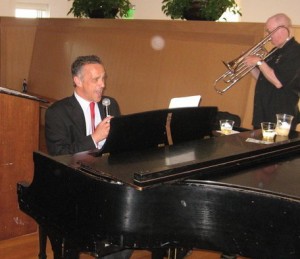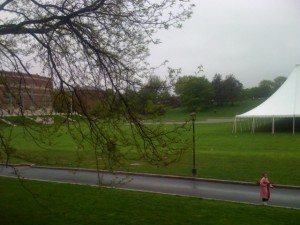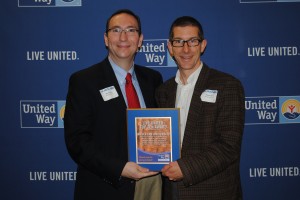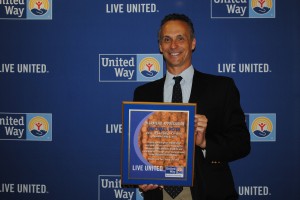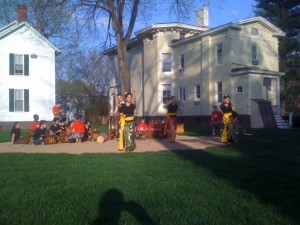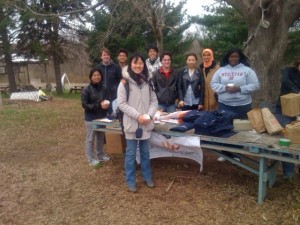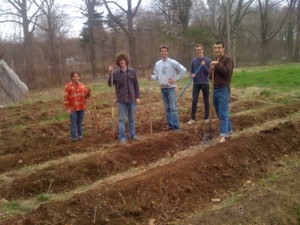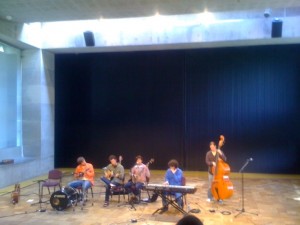Each April I enjoy seeing the increased traffic of visitors to campus who have come to see what makes Wesleyan such a magical place. Some are high school seniors who have already been admitted, others are juniors just starting their college search. They have heard about Wesleyan: its great faculty and its creativity, its activism and its research opportunities. They may have heard about the vibrant music scene at Eclectic, or the spring evenings on Foss Hill. They want to check us out.
Most of the students who visit Wes on their campus tours have already seen or are on their way to see other liberal arts colleges and highly selective universities. Last year I blogged about whether the distinctions that are so important to the students, faculty and staff of these schools come through to visitors. With WesFest (our annual celebration for admitted students) starting today [Thursday, April 14], I thought I’d reprise some of that post.
If a student has been admitted to Wes, then he or she probably has other fine options. How to choose? For some, the decision will be made on an economic basis. Which school has given me the most generous financial aid package? Wesleyan is one of a small number of schools that admits students irrespective of their ability to pay, and which meets the full need of students, according to a formula developed over several years. There are some schools with larger endowments that can afford to be even more generous than Wes, but there are hundreds (thousands?) of others that are unable even to consider meeting a student’s financial need over four years of study. I am proud of our financial aid program, and we work hard to strengthen it.
After answering the question of which schools one can afford, how else does one decide where best to spend one’s college years? Of course, size matters. Some students are looking for a large university in an urban setting where the city itself plays an important role in one’s education. Campuses in New York and Boston have become enormously popular. But if one seeks out small classes and strong, personal relationships with faculty, then liberal arts schools, which pride themselves on providing cultural and social life on a residential campus, are especially compelling. You can be on a campus with a “human scale” and still have plenty of things to do. Wesleyan is somewhat larger than most of the liberal arts colleges, but much smaller than the urban or land grant universities. We feel that this gives our students the opportunity to have a broad curriculum and a variety of cultural activities on campus, while still being small enough to encourage regular, sustained relationships among faculty and students. You can always meet new people, and you are unlikely to get lost in the crowd.
All the selective small liberal arts schools boast of having a faculty of teacher/scholars, of a commitment to research and interdisciplinarity, and of encouraging community and service. So what sets us apart from one another after taking into account size, location, and financial aid packages? What are students trying to see when they visit Amherst, Yale and Wesleyan, or Tufts, Brown and Middlebury?
Knowing that these schools all provide a high quality, broad and flexible curriculum with strong teaching, and that the students all have displayed great academic capacity, prospective undergrads are trying to discern the personalities of each school. They are trying to imagine themselves on the campus, among the people they see, to get a feel for the chemistry of the place — and they wonder whether they will be happy in that particular context. Hundreds of visitors will be coming to Wesleyan this weekend for WesFest. They will go to classes and athletic contests, musical performances and parties. And they will ask themselves: Would I be happy at Wesleyan?
I hope our visitors get a sense of the personality of the school that I so admire and enjoy. I hope they feel the exuberance and ambition of our students, the intelligence and care of our faculty, the playful yet demanding qualities of our community. I hope our visitors can sense our commitment to creating diversity in which difference is embraced and not just tolerated, and our commitment to civic engagement as a key part of one’s education and approach to life. Even in a short visit to campus, I want students to get a sense of the opportunities here for doing intellectual work at the highest level. Our students publish their undergraduate research projects, develop shows and make films that travel the country, create sustainable organizations that make a difference in the lives of people all over the world. And they do so with the enthusiastic support of their friends and teachers (and president!).
We all know that Wesleyan is hard to get into. And even in the group of highly selective schools, Wes is not for everybody. We aspire to be a community committed to boldness as well as to rigor, to idealism as well as to effectiveness. Whether in the sciences, arts, humanities or social sciences, our faculty and students are dedicated to explorations that invite originality as well as collaboration. The celebration of senior theses completions at the library this week said a lot about who we are. We know how to work hard, but we also know how to enjoy the work we choose to do. That’s been magically appealing to me for more than 30 years. I bet the magic will strike many of our visitors, too.



